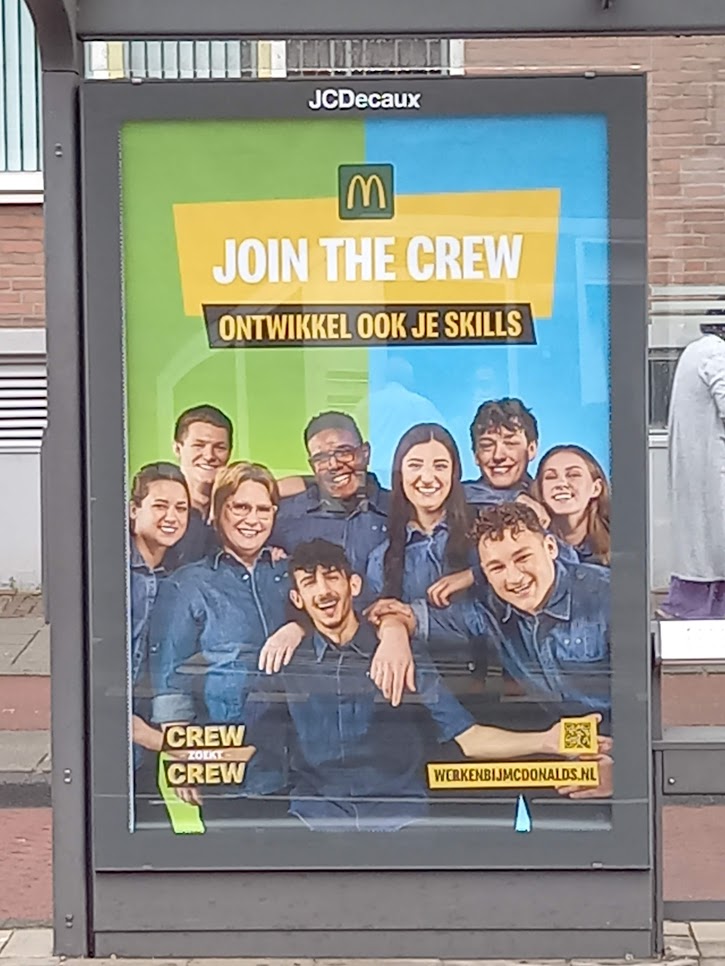This bus shelter poster was seen in Amsterdam a few months ago. It shows a group of young people in their twenties smiling and posing like friends would. The happy faces convey the idea that working at McDonald’s is all about having fun with a cool team of co-workers, and the guy in the middle even opens his arms in greeting, as if to embody the invitation above: “Join the crew”. While this glamorized image of working at McDonald’s is probably the first thing that jumps out of the poster, it is not what struck me the most. After all, McDonald’s and its so-called “McJobs” have often been criticized for exploiting young workers with low wages and tedious work. So it comes as no surprise that the world’s largest fast-food restaurant chain is trying to promote a rewarding self-image with much advertising.

No, what really struck me was the subtitle “Develop your skills too” (“Ontwikkel ook je skills” in Dutch), which suggests that working at McDonald’s is not just about having fun: by working there, young people will also acquire useful skills. In other words, McJobs should not be seen as student jobs chosen mainly for lack of anything better, but as real opportunities for young people to develop their skill portfolios and prepare for the next steps in their careers. This short sentence reverses another stigma that is often attached to work in the fast food industry: that it is low-skilled, or even unskilled. This touches on an interesting and long-standing debate in the social sciences: is there such a thing as unskilled work?
Scholars disagree about whether and what workers learn while performing low-skilled jobs. By definition, such jobs involve simple tasks that can be learned very quickly without prior experience, such as peeling vegetables and frying potatoes. For some scholars, the fact that fast-food workers are easily replaceable explains – and sometimes justifies – the low wages and status associated with these jobs. But does this mean that people performing routine tasks do not acquire skills? It’s a safe bet that someone who has been frying potatoes for a year is more competent than a newcomer to the job.
In fact, there are several reasons to believe that even very routine work involves the acquisition of some knowledge and know-how. First, the routinization of tasks always faces limitations in practice: even in a well-functioning organization, a grain of sand can always be expected to clog things up and force workers to improvise and make decisions. Second, and more fundamentally, there is evidence that even tasks that are perceived as purely manual or physical require cognitive skills. For example, being a plumber doesn’t just mean bending over and fumbling around under a sink: it also requires a solid knowledge of safety standards and the materials used, not to mention the ability to adapt to the specifics of each building.
Returning to the example of fast food jobs, several characteristics make it likely that workers will need to develop skills to adapt to a fast-paced work environment. Workers often have to juggle multiple tasks, such as processing orders while preparing drinks and keeping an eye on the room. They need to learn how to deal with overloading and speed-ups, how to interact with customers, and how to maintain a bright smile under all circumstances. In addition, with the widespread use of self-service kiosks in the fast-food industry, workers now have to learn how to work with increasingly sophisticated payment systems. In this sense, even though fast-food workers perform tasks that are simple in themselves, they develop more general skills that are relevant in other work contexts, such as cognitive skills (e.g., assimilating information, developing memory), presentation skills, and communication skills.
As a result, while the learning curve of McJobs may be fast – certainly faster than learning to fix a central heating system – describing the work as unskilled does not do justice to the skills that workers need to develop on the job. An important question, however, is what young people can do with such skills. For example, can they facilitate their transition to more stable and better-paying jobs? Or is this work experience only valued if it is combined with more certified skills, i.e. diplomas? Take the self-made billionaire Jeff Bezos, who spent a summer flipping burgers at McDonald’s in his youth: was it that that launched his career, or the fact that he was one of the top students at his university? The answer is likely much more nuanced, and these are the sorts of things we typically think about in the CAREER project. We are particularly interested in understanding what kinds of skills matter in the labor market, and for whom.
To read more about this topic:
Gould, A. M. (2010). Working at McDonalds: Some redeeming features of McJobs. Work, Employment and Society, 24(4), 780–802. https://doi.org/10.1177/0950017010380644
Kusterer, K. C. (1978). Know-how on the job: The important working knowledge of “unskilled” workers. Westview Press.
Newman, K. S. (2000). No shame in my game: The working poor in the inner city. Vintage Books and Russell Sage Foundation (see Chapters 4 & 5).
Wacquant, L. (2002). Scrutinizing the Street: Poverty, Morality, and the Pitfalls of Urban Ethnography Sidewalk . American Journal of Sociology, 107(6), 1468–1532. https://doi.org/10.1086/340461 (see pp. 1507-1511).



